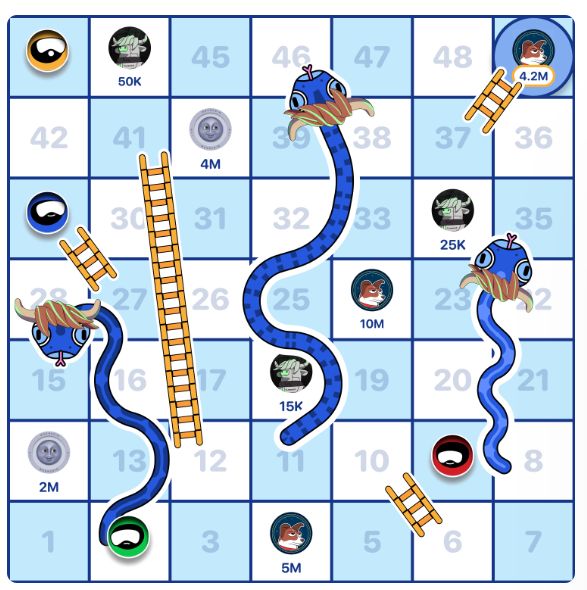Snakes & Ladders
Flipside AI
The Eclipse blockchain demonstrates robust user engagement with 37,549 total moves and a dynamic rewards system, where users earned 1,696 prizes averaging 199,000 lamports per move. Users predominantly earned 4.2m Laika prizes, representing 52.66% of total prize distribution, with daily ETH prize earnings showing volatility ranging from 0.15-0.25 ETH and a significant spike to 0.433 ETH. Despite a concentrated user activity pattern where 2,751 users made a single move, high-frequency transaction users show potential for positive Ethereum returns, highlighting the platform's nuanced reward mechanism.
Snakes and Ladders is a simple board game played on a 7x7 grid, totaling 49 squares. The player rolls a die to move, aiming to reach square 49. Ladders allow you to climb up, while snakes cause you to slide back. It's all about luck, not skill. There are 8 prizes spread across these 49 squares, each with a specific value in a crypto token. However, due to the volatility of the crypto market, the values of these prizes can only be accurately compared at a specific time. For each move, the player must spend a price of 0.000199 ETH. In this dashboard, we monitor stats like the total number of plays, total amount spent by players, gains, and average stats for each player, investigating the money return of the game from a player's perspective.

According to the relationship between users' earnings and the number of moves they make, users with positive net earnings played fewer than 50 moves. Additionally, the more moves a player made, the more their earnings decreased.
Since the prizes are tokens with variable value over time, all their value is converted to ETH value each day. Therefore, the prizes' value on the chart differs each day. Additionally, the distribution of received prizes, as shown in the pie chart, is not constant per prize. Considering the weight of prizes based on their earned count, we can see the following charts that define a Prize Worth Factor for each day. This factor shows how worthwhile it is to play to earn a prize on any given day; if it is higher than 1, playing to earn a prize is worthwhile. Otherwise, the chances of having a positive earning decrease as the factor value decreases. (left chart)
The right chart depicts the number of moves needed to be taken to earn one prize and whether it is worth the value spent on them. When the green dots surpass the blue ones, it seems actually worthy to play.